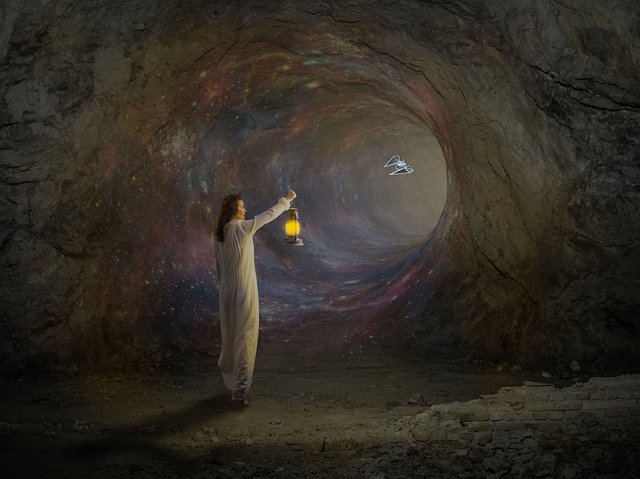The theory of simulation. "The myth of the cave" of Platon.
Simulation theory, has existed for a long time. We can say that since the days of Plato. Proponents of the theory of simulation refer to the" myth of the cave "from the seventh book of the work, this philosopher, under the title" State", written in 360 BC.

Plato, often compared with the so-called cave of the sensual world. Here's a quote from his dialogue:
You can be likened to our human nature in regards enlightenment and ignorance, that's what state... take a look: because the people are dwelling underground like caves, where in all its length runs a wide lumen. From a young age they have shackles on their feet and on their necks, so that people will not move, and they see only what they have right before their eyes, for they cannot turn their heads because of these shackles. People turned back to the light emanating from the fire that burns far above, and between the fire and prisoners is a top road, fenced — look — a low wall like the screen which magicians put their assistants, when on top of the screen show the dolls.
Is I can imagine.
— So introduce yourself and what's behind that wall other people have a different utensil, holding it so that it is visible over the wall; they are carrying and the statues and all images of living creatures made from stone and wood. Thus, as usual, one of carriers talk, others are silent.
— You draw the strange image and strange prisoners!
— Like us. First of all, don't you think, in this kind of situation, people see something, whether his or someone else's, except for the shadows cast by the fire in front of them the wall of the cave?
The idea of finding people in some kind of enclosed space, on the walls of which man can not see anything, was a cornerstone in the philosophy of Plato. That is, a person believes only what he sees in front of him, what he hears around him and the smells that he feels and if he does not see something and he does not hear, then this simply does not exist. People do not pay attention to any flashings and shadow of something else, if he does not have a clear understanding of this phenomenon. He simply has no desire to ponder the essence of what is happening, to accept the idea that the world around him is limited to the wall, for which he can not look.
Plato believed that most people are not aware of their limited existence. This can be understood only by some philosophers, and people are casually aware of the limitations of the world around them, just can't understand and were afraid to make haste to return to the "cave":
***When any of these will remove the shackles, make him suddenly to stand up, turn my neck, walk and look up toward the light, it will be painful to do this he would be unable to look at bright lights on those things, the shadow of which he had seen before. And what do you think he'd say when they begin to tell him that he had seen nothing before, and now, as he approached being and turned to the more genuine, he could find the right look? Yes, even if will point to this or that flashing thing in front of him and ask what it is, and in addition will make him answer! Do you feel that it is extremely difficult and he will think much more truth that he had seen before that it shows now?
- Of course, he so is going to think.
— And if you get him to look directly at the light isn't hurting his eyes, and he will not come back running to do with what he can see, considering that it really is authentic the things shown to him?
Yes, it is.***
Only philosophers are able to "see" the space around us. But people don't believe philosophers because it's easier to live like this. And habitual:
Still and ponder this: if a man like this again down there and I sat in the same place, would not his eyes covered by the darkness with this sudden departure from the light of the Sun?...What if he had to contend with these eternal prisoners again, looking at the meaning of those shadows? While his vision will not become dull and the eyes will not get used — and it would require considerable time, — isn't it would seem he's funny? About it would say of his ascension he returned with a broken vision, and thus should not even try to go up. And who would release the prisoners to lead them up, wouldn't they kill him if he fell into their hands?...
The idea of Plato's philosophy is that one cannot live only in accordance with the visual world. Need to be able to do reasoning, be able to see the that lie for "walls."
- And so, my dear Glavkon, this similarity should be applied to everything that was told earlier: the area covered by sight is similar to a prison dwelling, and light from fire is likened in it to power of the Sun. The ascent and contemplation of things above is the ascent of the soul into the realm of the soul...***
Of course Plato could not talk about the "virtuality" of the world around us. But he was clearly suggesting that we didn't see much. That even the that see, not can recognize. Plato believed, that the world around us much wider and limitless. But people are not ready, and do not want to realize it.

Is there any intersection with simulation theory in Plato's philosophy? Perhaps be. For example the film" Matrix "almost literally echoes the" myth of the cave " Plato. Only the characters in this film are moved to a more modern world.
Personally, I think that to narrow the worldview of Plato to the theory of simulation is somewhat wrong. His philosophy touches on much broader concepts. Most followers of the virtual world can rely on some of his statements in which Plato, in part, agrees with them through the centuries.
This post has received a 3.67 % upvote from @booster thanks to: @gildar.
To listen to the audio version of this article click on the play image.

Brought to you by @tts. If you find it useful please consider upvote this reply.
This is brilliant! This is thef first time i heard about the myth of the cave.
This post has received a 6.58 % upvote from @boomerang.
thanks for sharing! i will start following your exciting posts! Checkout my posts as well
Интересно! Философия Платона, действительно уникальна и затрагивает очень широкие понятия.
Мне нравятся его мудрые мысли, особенно эта:
«Хорошее начало – уже полдела».
И вот эта мудрая мысль.
I complained about the stupid laptop keyboard. My "spiritual" friend said that we are as dumb as that laptop that doesnt know that it is sitting on a table. I think the myth of the cave, as you describe it, is a good metaphor for the theory of simulations but it is just one metaphor.
Thanks for making us think about ideas @gildar